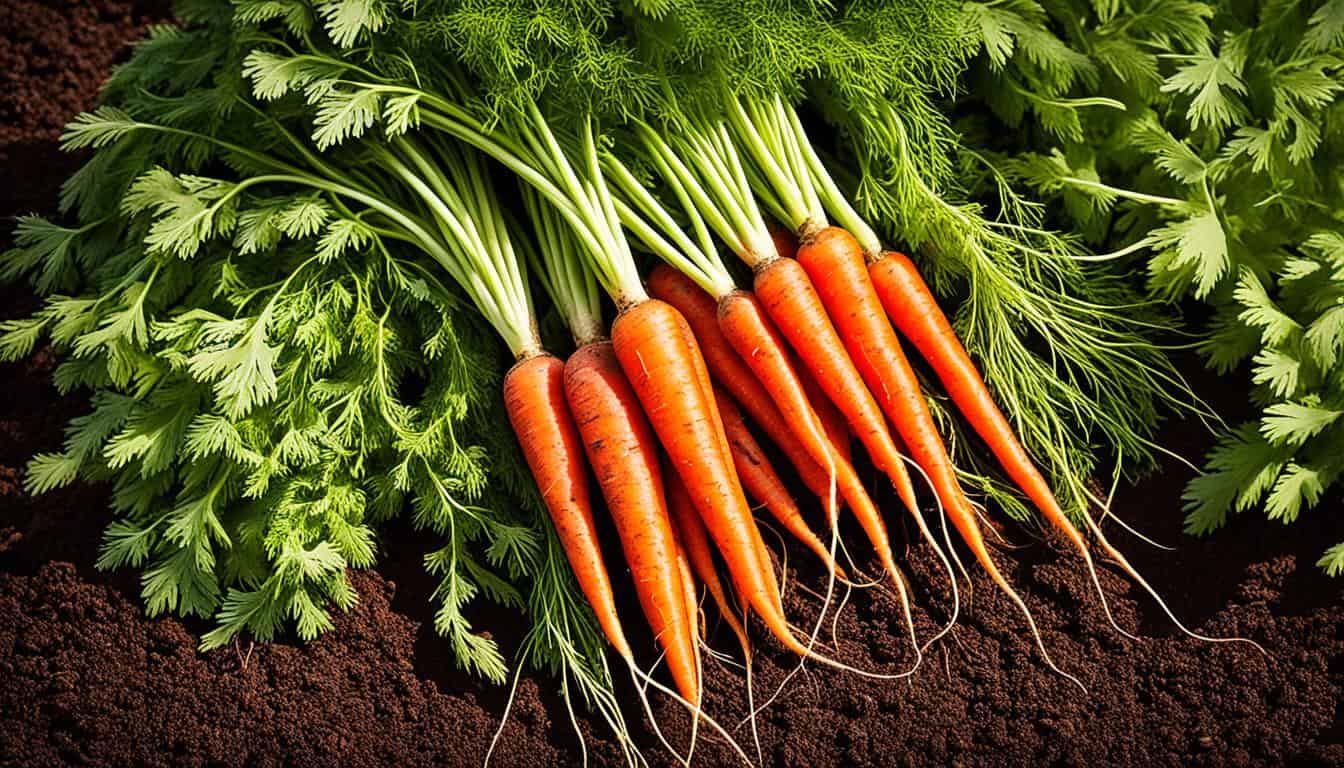Did you know that red carrots are not only delicious but also packed with health-boosting nutrients? These vibrant root vegetables offer a wide range of benefits that can support your overall well-being. From improving your vision health to strengthening your immune system, red carrots are a powerhouse of nutrition that deserves a place in your diet.
Key Takeaways:
- Red carrots are rich in beta-carotene, fiber, vitamin C, and antioxidants.
- They contain lycopene, which helps prevent heart disease and certain types of cancer.
- Red carrots can be easily incorporated into various recipes and dishes.
- They can be grown at home with relative ease or purchased from local sources.
- Including red carrots in your diet can contribute to healthier skin and improved eye health.
Nutritional Facts of Red Carrots
If you’re looking to boost your health with a delicious vegetable, look no further than red carrots. These vibrant root vegetables not only add color to your plate but also offer a range of nutritional benefits. Let’s dive into the nutritional facts of red carrots and discover why they should be a part of your diet.
A cup of chopped raw red carrots contains:
- 52 calories
- 1 gram of protein
- 0.3 grams of fat
- 12 grams of carbohydrates
- 3.5 grams of fiber
Red carrots are low in calories and fat, making them an excellent choice for those watching their weight or looking to maintain a healthy diet. Their high fiber content promotes healthy digestion and helps you stay full for longer.
What makes red carrots truly special is their impressive nutrient profile. They are an excellent source of:
- Vitamin A: Red carrots are packed with beta-carotene, a pigment that the body converts to vitamin A. Vitamin A is essential for maintaining good vision, supporting a healthy immune system, and promoting vibrant skin.
- Vitamin C: Red carrots are also a great source of vitamin C, a powerful antioxidant that helps protect cells from damage and supports immune function.
Improving Vision, Skin, and Immune Health
The high beta-carotene content in red carrots provides numerous health benefits. Beta-carotene is converted to vitamin A in the body, which plays a crucial role in eye health. Regular consumption of red carrots can help improve vision and reduce the risk of age-related macular degeneration.
Additionally, the antioxidants found in red carrots, such as beta-carotene and vitamin C, support vibrant and healthy skin. These antioxidants help reduce damage caused by environmental factors and promote collagen production, leading to improved skin elasticity, hydration, and texture.
Furthermore, incorporating red carrots into your diet can boost your immune system. Vitamin A and vitamin C both play vital roles in supporting immune function, helping the body fight off infections and illnesses.
Now that you know the nutritional facts and health benefits of red carrots, it’s time to add them to your meals and snacks. Get creative and enjoy the versatile flavors and vibrant colors of red carrots to support your overall well-being.
Unique Health Benefits of Red Carrots
When it comes to reaping the benefits of red carrots, nature truly delivers. These vibrant root vegetables offer a plethora of unique health advantages that set them apart from their orange counterparts. From protecting our hearts to boosting our immune systems, red carrots are a powerhouse of nutrients that promote overall well-being.
One of the standout benefits of red carrots is their high lycopene content. Lycopene is an antioxidant that has been linked to a reduced risk of heart disease and certain types of cancer. This powerful compound helps neutralize harmful free radicals in the body, protecting our cells from damage and supporting cardiovascular health.
Red carrots are also an excellent source of beta-carotene, which plays a vital role in promoting optimal vision health. As our bodies convert beta-carotene into vitamin A, it supports the normal functioning of our eyes and helps maintain clear vision. Including red carrots in your diet can help prevent vision-related issues and keep your eyes healthy and vibrant.
Furthermore, the fiber content in red carrots has a multitude of benefits for our digestive systems. Adequate fiber intake promotes healthy digestion, prevents constipation, and aids in weight management. The soluble fiber found in red carrots helps regulate blood sugar levels, reducing the risk of diabetes and promoting overall metabolic health.
As if these benefits weren’t enough, red carrots are also packed with other essential antioxidants. These compounds work together to combat free radicals, protect our cells from oxidative stress, and slow down the aging process. Consuming red carrots regularly can help keep your skin looking youthful and radiant, while also reducing the risk of chronic illnesses associated with aging.
Take a look at the nutritional benefits of red carrots in the table below:
| Nutrient | Amount per Cup (Chopped) |
|---|---|
| Calories | 52 |
| Protein | 1g |
| Fat | 0.3g |
| Carbohydrates | 12g |
| Fiber | 3.5g |
| Vitamin A | 1071 mcg |
| Vitamin C | 7.6 mg |
Now that you know about the unique health benefits of red carrots, it’s time to incorporate them into your diet. Whether you enjoy them roasted, steamed, or grated into a salad, these vibrant root vegetables are sure to elevate your culinary experience while nourishing your body.
Stay tuned for the next section, where we explore the different colors of carrots and their specific benefits.
Different Colors of Carrots and Their Benefits
Carrots come in different colors, each with its own set of health benefits. Let’s explore the unique advantages offered by yellow, purple, and red carrots.
Yellow Carrots: Enhancing Vision Health
Yellow carrots contain xanthophylls, which are beneficial for maintaining good vision health. These compounds, found in the yellow pigment of the carrots, help protect the eyes from harmful blue light and reduce the risk of age-related macular degeneration.
Purple Carrots: Antioxidant Power and Anti-Inflammatory Effects
Purple carrots are rich in anthocyanins, powerful antioxidants that give them their vibrant hue. These antioxidants have anti-inflammatory properties and may help reduce the risk of chronic diseases, including heart disease and certain types of cancer.
Red Carrots: Protecting Heart Health and Fighting Cancer
Red carrots, like the organic red carrot variety, contain lycopene, a potent antioxidant responsible for their red color. Lycopene helps protect against oxidative stress, reducing the risk of heart disease and certain types of cancer, such as prostate and breast cancer.
Each colored carrot variety offers unique compounds that contribute to overall health and well-being.
Now that we’ve explored the benefits of different colored carrots, let’s take a closer look at their nutritional facts in the next section.
Baby Carrots: Facts and Nutritional Benefits
When it comes to snacking on carrots, baby carrots are a popular choice. These small, bite-sized carrots are not only convenient but also packed with nutritional benefits. Let’s explore the facts about baby carrots and discover why they are a healthy option.
First things first, baby carrots can be either immature carrots harvested early or fully-grown carrots that have been cut and peeled to achieve their small size. Despite their name, baby carrots have similar nutritional profiles to regular-sized carrots.
One of the key advantages of baby carrots is their low calorie content. Each piece of baby carrot contains approximately 4 calories, making them a guilt-free snack option. They are also a great source of essential nutrients such as calcium, magnesium, potassium, phosphorus, and iron.
| Nutrient | Amount per 100g |
|---|---|
| Calcium | 33mg |
| Magnesium | 10mg |
| Potassium | 195mg |
| Phosphorus | 30mg |
| Iron | 0.4mg |
In addition to their nutrient content, baby carrots are also a rich source of dietary fiber. Fiber plays a vital role in digestion, helps maintain a healthy weight, and supports overall gut health.
Whether you’re looking for a quick snack or a nutritious addition to your meals, baby carrots fit the bill. They are versatile and can be enjoyed on their own, dipped in hummus or other healthy dips, or added to salads and stir-fries for an extra crunch.
Did you know? Baby carrots can make a great addition to your kid’s lunchbox or your on-the-go snack pack. They are not only delicious but also provide a healthy dose of vitamins and minerals.
So next time you’re craving a snack, reach for a handful of baby carrots. Not only will they satisfy your cravings, but they will also contribute to your daily nutrient intake in a convenient and tasty way.
Growing Red Carrots at Home
If you’re looking to add fresh, organic red carrots to your diet, why not try growing them at home? Not only is it a rewarding experience, but it also allows you to enjoy the satisfaction of eating vegetables you’ve cultivated yourself. Red carrots are resilient in cold climates and can be easily grown in your backyard or even in containers on your balcony.
Planting and Caring for Red Carrots
To start your red carrot farming journey, you’ll need to plant the seeds. Prepare a well-draining soil bed or container with full sun exposure. Carrot seeds are small, so make sure to space them out and cover them lightly with soil. It’s important to water the seeds regularly but avoid overwatering, as it can lead to rot.
Red carrots take approximately 100 days to mature. During this time, ensure the soil remains moist but not waterlogged. Once the green tops of the carrots start to emerge from the soil, you can thin them out to provide ample space for each carrot to grow. This step is crucial for achieving straight and healthy carrots.
Carrots require minimal attention during the winter months, making them an ideal vegetable for home gardeners. Be sure to protect them from frost, and consider covering the soil with mulch to keep the temperature stable.
Harvesting Red Carrots
After patiently waiting for your red carrots to reach maturity, it’s time for the exciting part – harvesting! About 100 days after planting, check for signs of readiness by gently pulling one carrot. If the carrot comes out easily with a vibrant red color, it’s time to harvest. You can use a garden fork or your hands to gently loosen the soil around each carrot before pulling it out.
Remember to handle the red carrots gently during harvest to prevent any damage or bruising. If you plan to store them, remove the green tops, leaving about an inch of stem attached to minimize the risk of spoilage. Store your freshly harvested red carrots in a cool and dark place for extended shelf life.
Where to Buy Red Carrots
If you prefer ready-to-eat red carrots or are unable to grow them at home, you can easily find them at local farmers’ markets or grocery stores. Look for organic options to ensure you’re getting high-quality, pesticide-free produce. Local farms and online organic food retailers are also great sources for purchasing red carrots.
Remember, growing your own red carrots not only allows you to enjoy the freshest produce but also gives you a sense of accomplishment and a deeper connection to your food. Plus, it’s a fun and educational activity for the entire family!
| Advantages of Growing Red Carrots at Home | Benefits |
|---|---|
| Economical | Save money by growing your own red carrots instead of buying them. |
| Control over Pesticides | Ensure your red carrots are free from harmful pesticides by growing them organically at home. |
| Freshness and Flavor | Enjoy the superior taste and freshness of homegrown red carrots. |
| Connection to Nature | Experience the joy of nurturing and harvesting your own vegetables. |
Carrot Greens: Edible and Nutritious
Did you know that the leafy tops of carrots, known as carrot greens, are not only edible but also packed with nutrients? Carrot greens are often overlooked, but they offer a range of health benefits that can enhance your meals and support your well-being.
Carrot greens are a fantastic source of vital nutrients such as vitamin K, potassium, minerals, and antioxidants. Including them in your diet can contribute to a balanced and nutritious eating plan.
There are several ways you can incorporate carrot greens into your meals. One popular option is to add them to salads, where they provide a beautiful pop of color and a subtle, herbaceous flavor. You can also sauté carrot greens with other vegetables for a quick and nutritious side dish. Additionally, they make an excellent addition to soups and stews, infusing your dishes with added nutrients and flavor.
While carrot greens can have a slightly bitter taste, they offer a unique combination of nutrients that can boost your overall health. Here are some of the key benefits:
- Vitamin K: Carrot greens are an excellent source of vitamin K, a nutrient essential for blood clotting, promoting bone health, and supporting heart health.
- Potassium: Adding carrot greens to your meals can increase your potassium intake, which is important for maintaining healthy blood pressure and proper muscle and nerve function.
- Minerals: Carrot greens contain minerals like calcium, magnesium, and iron, which contribute to the health of your bones, muscles, and blood.
- Antioxidants: The antioxidants found in carrot greens help combat oxidative stress in the body, protecting your cells from damage caused by free radicals.
Next time you purchase carrots, don’t discard the greens! Take advantage of this often overlooked part of the vegetable and add some extra nutritional value to your meals.
Carrot greens not only enhance the flavor and nutritional content of your dishes but also contribute to a more sustainable approach to cooking. By utilizing more parts of vegetables, we can reduce food waste and make the most of what nature provides.
Remember to wash the carrot greens thoroughly before using them, as they can accumulate dirt and debris. Enjoy experimenting with carrot greens and discover creative ways to incorporate them into your meals.
Carrots for Healthy Skin
Carrots, including red carrots, offer a range of benefits for skin health. The key to their skin-loving properties is their rich content of beta-carotene, which the body converts into vitamin A. This essential nutrient plays a vital role in maintaining healthy skin.
Vitamin A is known for its ability to improve skin elasticity, hydration, and texture. It can help reduce the appearance of wrinkles and promote a youthful complexion. Including red carrots in your diet can be an excellent way to support your skin’s overall health and vitality.
In addition to vitamin A, carrots also contain vitamin C, another crucial nutrient for skin health. Vitamin C supports collagen production, a protein that provides structure and elasticity to the skin. This vitamin also acts as an antioxidant, protecting the skin from free radicals and UV damage.
When consumed regularly, carrots can contribute to healthier, glowing skin. They nourish the skin from within, helping to combat common skin issues and promoting a more youthful appearance.
To make it easier to understand, here’s a summary of the skin benefits of carrots:
Skin Benefits of Carrots:
- Improves skin elasticity
- Enhances hydration and texture
- Reduces the appearance of wrinkles
- Supports collagen production
- Protects against free radicals and UV damage
- Promotes a more youthful complexion
How to Incorporate Red Carrots into Your Diet
Including red carrots in your daily meals is a delicious and convenient way to reap their skin benefits. Here are a few ideas:
- Add grated red carrots to salads for a vibrant crunch.
- Blend red carrots into smoothies for a nutrient-packed boost.
- Roast red carrots with a sprinkle of herbs for a flavorful side dish.
- Incorporate red carrots into soups and stews for added color and nutrition.
- Enjoy red carrot sticks with a dip as a healthy snack option.
By incorporating red carrots into your diet, you can support your skin’s health and enjoy their delicious flavor.
Carrots for Eye Health
Carrots, including red carrots, are known for their positive impact on eye health. The beta-carotene in red carrots helps protect the eyes from sun damage and may reduce the risk of cataracts and other eye problems. Yellow carrots, with their high lutein content, have also been linked to improved eye health and a decreased risk of age-related macular degeneration.
It’s no secret that carrots are good for your eyes. The vibrant orange color of carrots is due to their high beta-carotene content, a precursor to vitamin A. Research suggests that diets rich in beta-carotene may help maintain and improve vision health.
“The beta-carotene in carrots is converted into vitamin A in the body. Vitamin A is essential for the health of the retina, which is responsible for converting light into signals that can be interpreted by the brain,” explains Dr. Emily Harris, a renowned ophthalmologist.
Studies have shown that consuming red carrots regularly can protect the eyes from sun damage caused by harmful ultraviolet (UV) rays. UV rays can lead to various eye conditions, including cataracts. The antioxidants present in red carrots act as a shield, neutralizing the harmful effects of UV rays and reducing the risk of developing cataracts.
Furthermore, yellow carrots, another variety of colored carrots, are known for their high lutein content. Lutein is a carotenoid that accumulates in the macula, a small area in the retina responsible for central vision. Research suggests that lutein plays a crucial role in preventing age-related macular degeneration, a leading cause of blindness in older adults.
Comparing the Beta-Carotene Content of Different Carrot Colors:
| Carrot Color | Beta-Carotene Content |
|---|---|
| Red Carrots | High |
| Yellow Carrots | High |
| Orange Carrots | High |
| Purple Carrots | Lower |
Carrot colors vary due to the different types and amounts of pigments present in the vegetable. While all carrots contain beta-carotene, red, yellow, and orange carrots tend to have higher levels compared to purple carrots. However, purple carrots contain other beneficial compounds, such as anthocyanins, which have their own unique health benefits.
Adding red carrots and other brightly colored carrots to your diet is a wise choice for maintaining optimal eye health. You can enjoy the natural sweetness and crunch of carrots in various ways – from raw in salads and snacks to cooked in soups, stir-fries, and stews. Incorporating red carrots into your daily meals not only benefits your eyes but also contributes to overall well-being.
Now that you know the impressive eye health benefits of red carrots, it’s time to make them a staple in your diet. Whether you prefer snacking on baby carrots, juicing them, or using them in your favorite recipes, these vibrant vegetables are sure to keep your eyes healthy and happy.
Potential Concerns and Precautions
While carrots are generally considered safe and healthy, it’s essential to be aware of a few potential concerns. Here are some important factors to consider:
Carrot Allergies
Some individuals may experience allergies or sensitivities to carrots, especially if they have pollen-related allergies. If you notice any adverse reactions after consuming carrots, such as itching, swelling, or difficulty breathing, it’s crucial to seek medical attention immediately.
Carrot Contamination
Contamination of carrots with pathogens can occasionally occur during production and packaging. To minimize the risk of foodborne illnesses, it’s important to take necessary precautions:
- Wash carrots thoroughly under running water before consuming them, even if you plan to peel them.
- Avoid purchasing carrots with visible signs of mold, damage, or decay.
- Properly store carrots in a clean and dry environment to prevent contamination.
- Cook carrots thoroughly to eliminate any potential pathogens.
By following these simple steps, you can minimize the risk of consuming contaminated carrots and ensure your safety.
Carotenemia
Carotenemia is a harmless condition that causes the skin to turn orange-yellow due to excessive intake of beta-carotene, a compound found in carrots. While this condition is not harmful, it can be alarming if you’re not aware of its cause. If you notice a change in the color of your skin after consuming large quantities of beta-carotene-rich foods like carrots, it’s best to consult a healthcare professional. They can provide reassurance and guidance on a balanced diet.
Remember, moderation is key when it comes to consuming carrots or any other food. By being aware of these potential concerns and taking necessary precautions, you can safely enjoy the numerous health benefits that carrots have to offer.
Potential Concerns and Precautions Summary
| Concerns | Precautions |
|---|---|
| Carrot Allergies | Seek medical attention for allergic reactions |
| Carrot Contamination | Thoroughly wash, avoid damaged carrots, store properly, and cook thoroughly |
| Carotenemia | Consult a healthcare professional if skin discoloration occurs |
Conclusion
In conclusion, red carrots are a true superfood, packed with essential nutrients and health benefits. Their high content of beta-carotene, fiber, vitamin C, and antioxidants make them a valuable addition to any diet. Incorporating red carrots into your meals can support your vision health, promote healthy skin, boost your immune system, and contribute to overall well-being.
One of the best things about red carrots is their versatility in the kitchen. Whether you prefer them raw in salads or cooked in soups, stir-fries, or even desserts, the possibilities are endless. Explore red carrot recipes to discover new and delicious ways to enjoy this vibrant vegetable.
If you’re looking to take it a step further, consider growing your own red carrots. With proper care and attention, you can cultivate these nutritious vegetables right in your own backyard. Alternatively, you can find fresh red carrots at local farmers’ markets or grocery stores. Look for organic options to ensure you’re getting the highest quality produce without harmful pesticides.
Make red carrots a regular part of your diet and reap the numerous health benefits they offer. Whether you’re looking to boost your immune system, support your vision, or simply enjoy a tasty and nutritious vegetable, red carrots are a fantastic choice. Start incorporating them into your meals today and experience the positive impact on your health and well-being!










Leave a Reply